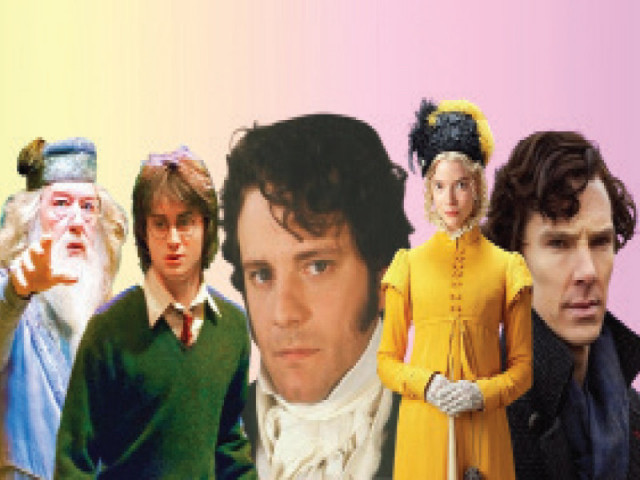Safe space for ‘snobby’ readers
Lamenting the treacherous journey of books to screen

Reader (noun): A person with a bedside table permanently piled high with books with a worrying centre of mass. They dare not breathe too hard on the pile lest their books topple over.
Snobby (adjective): A person secure in the knowledge that they outclass everyone else in their orbit.
Snobby reader (noun): Title bestowed upon a reader who scrutinises book adaptations with a microscope and a solid determination to be disappointed and heap scorn and derision. Feels a rusty knife slice into their heart at the sight of Kenneth Branagh’s bizarre Poirot moustache in Murder on the Orient Express. Feels the same knife pierce their soul at the sight of Voldemort hugging Malfoy in Deathly Hallows 2. Yet, will watch adaptations at least once anyway.
The diamond(s) in the rough
Of course, not all film or television directors nurse a flaming passion for butchering books. There have been onscreen adaptations that tend to the source material with the faithfulness of a devout nun and the tenderness of a vet operating on a butterfly, and the gold medal here can only go to the BBC 1995 Pride and Prejudice miniseries.
The 1995 Pride and Prejudice, headed by an exceptional cast and held together by a simple yet stunning piano-oriented soundtrack, is a masterclass in how to bring a novel to life by staying true to its spirit. Those who have studied the art of the smoulder from Flynn Ryder (of Tangled fame) but wish to hone their skills further need only study Colin Firth’s Mr Darcy gazing at Elizabeth Bennet as she plays the pianoforte before a disapproving Lady Catherine de Bourgh.
Hardcore Pride and Prejudice fans are united in agreement that there is no finer Mr Darcy than Firth. The man himself has ruefully admitted, “I’m fully aware that if I were to change professions tomorrow, become and astronaut and be the first man to land on Mars, the headlines in the newspapers would read: ‘Mr Darcy Lands on Mars.’” This is the fate in store for you when you gift wrap a beloved character from a beloved novel AND jump in a lake for no reason whatsoever.
If you are less interested in looks of adoration but prefer to focus on the perfect scowl, you can also study Mr Darcy observing the horde of idiot dancers at the assembly ball before he subsequently rejects his future wife. For the female version of an Oscar-worthy scowl, you are invited to gaze at Anna Chancellor’s Miss Bingley as she tries to keep it together when Mrs Bennet insists upon being thrown a ball. If Chancellor’s Miss Bingley could somehow cross over and slip into the Cinderella universe as one of the stepsisters (ideally Drusilla), no one would bat an eye.
Not just period dramas
To step into a different time period altogether when crafting a television series based on literature is a risky move, but BBC struck gold once again with Benedict Cumberbatch’s Sherlock. Even those who had never touched Arthur Conan Doyle’s detective series – or had fallen asleep repeatedly when attempting to do so – fell in love with a Sherlock Holmes that had never been seen before.
Set in modern-day London with an attention to detail allowing each episode to stretch to ninety minutes, here is a series that even the snobbiest of readers will forgive for straying so far from the source novels. As Pride and Prejudice did in 1995, by taking the time to craft a solid mystery in every episode, Sherlock stays true to the very essence of Doyle’s character. An small but exceptional cast and a haunting minor-key soundtrack that goes straight for the heart ensure that this is a series that will preserve a beloved literature collection for generations to come.
A crime against literature
Sadly, most book adaptations, as snobby readers are all too painfully aware, are spearheaded by a team that is hell-bent on inventing new material as they simultaneously blitz away all-important elements from the novel.
Despite their gargantuan international popularity, the Harry Potter films are a case study detailing how to disappoint devoted book lovers. Hardcore Potterheads could barely speak as Michael Gambon’s Dumbledore shouted, “Harry did you put your name in the goblet of fire?!” in the Goblet of Fire. (For the tragically unversed, Dumbledore poses this question calmly in the book.)
Fans had already been darkly questioning why Richard Harris, the original Dumbledore, had to selfishly die after completing the second instalment of the series, but had resigned themselves to the knowledge that any Harry Potter film once Chris Columbus left after the first two films would be an assured disappointment. (And yet we all tortured ourselves at the cinema with every new Potter film regardless).
Prisoner of Azkaban introduced Lupin and his hideous moustache, a casual relationship with school uniform, and a Sirius Black who most assuredly did NOT look like the 80s rock god he was supposed to look like. Goblet of Fire gave Hermione a pink dress instead of blue and ended with Dumbledore blandly explaining Voldemort’s shenanigans as “Ah. Priori Incantatem.” Where the book. Just quite what movie fans who hadn’t read the chapter on Priori Incantatem derived from this context-less statement, I am not clear.
The car crash only snowballed as the series progressed. I personally had to shield my eyes as Harry and Hermione began their impromptu dance in the tent during one of the Deathly Hallows (rendering Harry’s subsequent “She’s like a sister” statement to Ron somewhat meaningless).
It is difficult to comment too much about the final Harry Potter films as they all get (literally) darker and darker. I had to squint through most of the last one, although perhaps that is a good thing. I’m not sure anyone should be forced to watch Dark Lord Voldemort hugging Malfoy in full technicolour glory.
Space does not permit me to cover the full spectrum of crimes committed by the Harry Potter film universe, we will end with yet another Austen adaptation, but one that went off the rails. Space, once again, does not permit me to cover the abomination that was Persuasion (2022), so we must be content instead with the travesty that was the 2020 version of Emma.
Dear Austen directors, please take note: Mr Knightley is not blond. People did not randomly burst into dance in the middle of the street (in broad daylight, no less.) And Emma does not develop a spontaneous nosebleed, ever, and certainly not the love of her life is proposing to her. Please do not expose us Austenites to such ghastliness again. Thank you.



















COMMENTS
Comments are moderated and generally will be posted if they are on-topic and not abusive.
For more information, please see our Comments FAQ